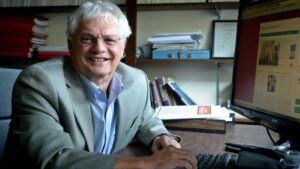 Longtime chair of the department and a fixture of the history faculty, Dr. Lloyd S. Kramer, plans to retire this year. It is fitting, then, that we take a moment to appreciate someone who has had a profound impact on this department, this university, and beyond.
Longtime chair of the department and a fixture of the history faculty, Dr. Lloyd S. Kramer, plans to retire this year. It is fitting, then, that we take a moment to appreciate someone who has had a profound impact on this department, this university, and beyond.
Dr. Kramer began his academic career as an undergraduate at Maryville College (1971) before going on to get his master’s at Boston College (1973) and his Ph.D. at Cornell University (1983). He served as a lecturer at Stanford University from 1983 to 1984 and then joined the faculty at Northwestern University from 1984 to 1986. In 1986, he accepted a position here at UNC Chapel Hill, becoming an Associate Professor in 1989 and a Full Professor in 1995.
While at Chapel Hill, Dr. Kramer has been a prominent presence in our department, both inside and outside the classroom. As a professor, Dr. Kramer has taught a variety of classes focused on European history, intellectual history, nationalism, and Atlantic history. He has also guided many graduate students to successful Ph.D’s. As a professor, Dr. Kramer said that he “felt very engaged by people in the History Department and by the graduate students who came here, by the undergraduate students who took history courses. I really like teaching North Carolina students.”
Beyond his role as a professor, Dr. Kramer also served as the History Department Chair starting in 2004. He served in that role until 2013. As chair, Dr. Kramer expanded the History Department, hiring around 25 new professors. This augmented the department’s scope on a global scale, marking a departure from its traditional strengths in European and American history. Dr. Kramer also played a big part in helping fund the department through private donors, as the resources for graduate students did not keep up with the department’s needs. This was due to various factors, including the 2009 recession and changes in state legislative priorities. This new funding was used for graduate research and summer funding, and helped lay the groundwork for later support from alumni, notably the Mark Clein funds.
Central to Dr. Kramer’s work as an intellectual and educator has been public awareness, outreach, and engagement. For this reason, his leadership roles have been varied. After working mainly in the department for the first five or so years, he became Associate Director of the Institute for the Arts and Humanities in 1992. He held that position for a number of years, and then in 1994-95 served as Acting Director while Director Ruel Tyson went on leave. He later served again as Associate Director at the IAH for some time in the early 2000s.
After completing his tenure as Department Chair, Kramer became Director of the Program in the Humanities and Human Values in 2014. The program changed its name to Carolina Public Humanities in 2017. In this prominent leadership role, Dr. Kramer continued to broaden his own and others’ horizons. Dr. Kramer explains that Carolina Public Humanities seeks to connect North Carolina, especially schoolteachers, with UNC faculty to help facilitate conversations and learning. This work includes a variety of programs, such as seminars, workshops for public school teachers, partnerships with community colleges, and public events. Its activities advance UNC’s mission to promote “knowledge-based services and other resources of the University to the citizens of North Carolina and their institutions to enhance the quality of life for all people in the State.” As a professor, Dr. Kramer has sought to inform the North Carolina public through a variety of public-facing activities, such as writing articles for the Raleigh News and Observer on subjects like the Marquis de Lafayette, the First World War, and historical French-American relations. He also has appeared several times on WCHL radio to discuss how a grounding in the humanities can better inform historical and current events.
In recent times, there have been questions about the value of history education to students in the modern world. Still, Dr. Kramer may have put it best in his speech to the graduating class of the History Department in 2021 when he said: “Even more important, perhaps, historical perspectives also prepare you for that year after you lose your first good job, or for that year in which you mourn the painful loss of a special relationship, or for that year in which you learn that you are seriously ill, or for that year in which every candidate you supported loses in the elections. Historical education, in short, gives you perspectives that help you move forward during the most difficult years of your life.” Dr. Kramer has given that perspective to generations of students and I for one, will forever be grateful that he did that here at UNC.
-James Britt
